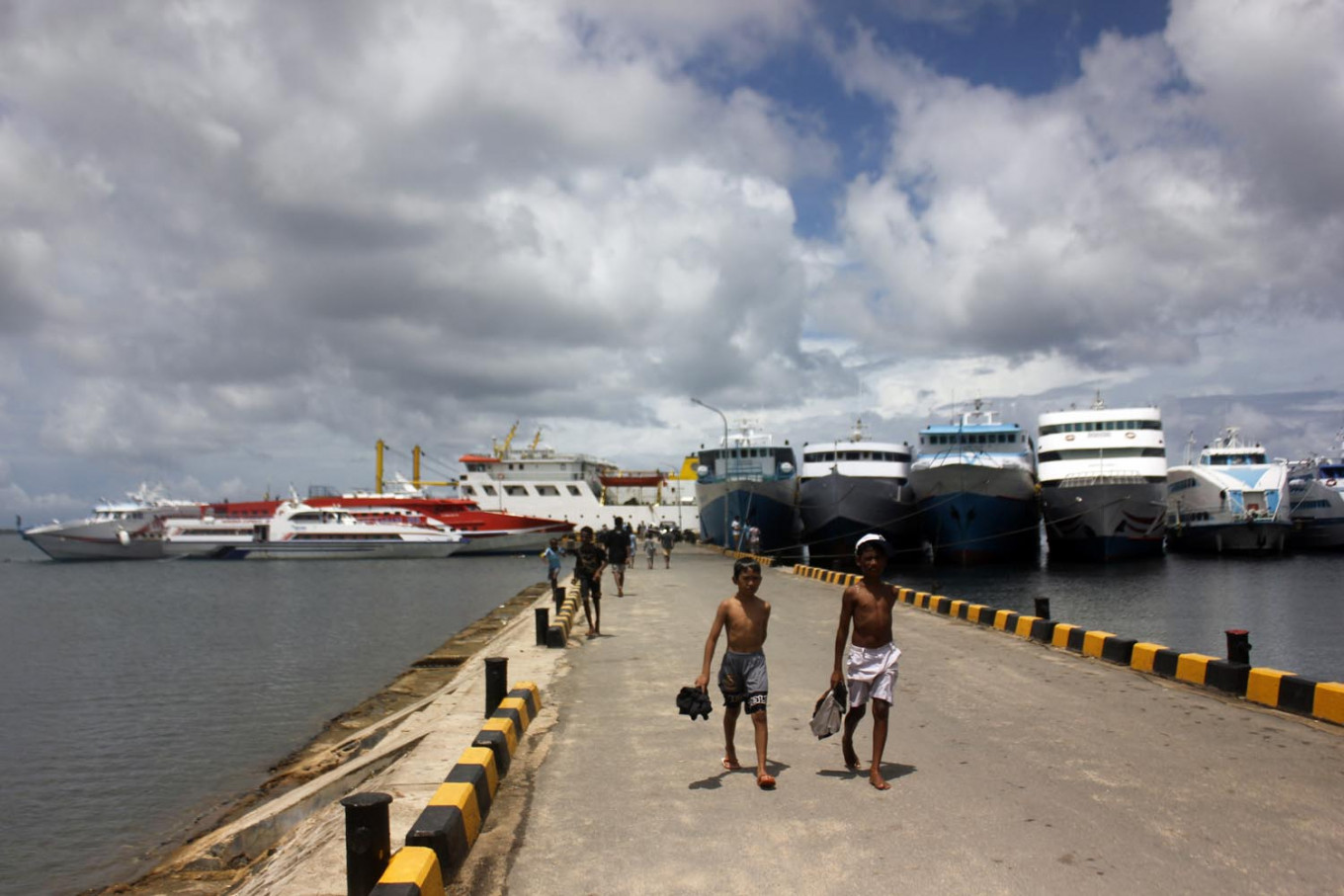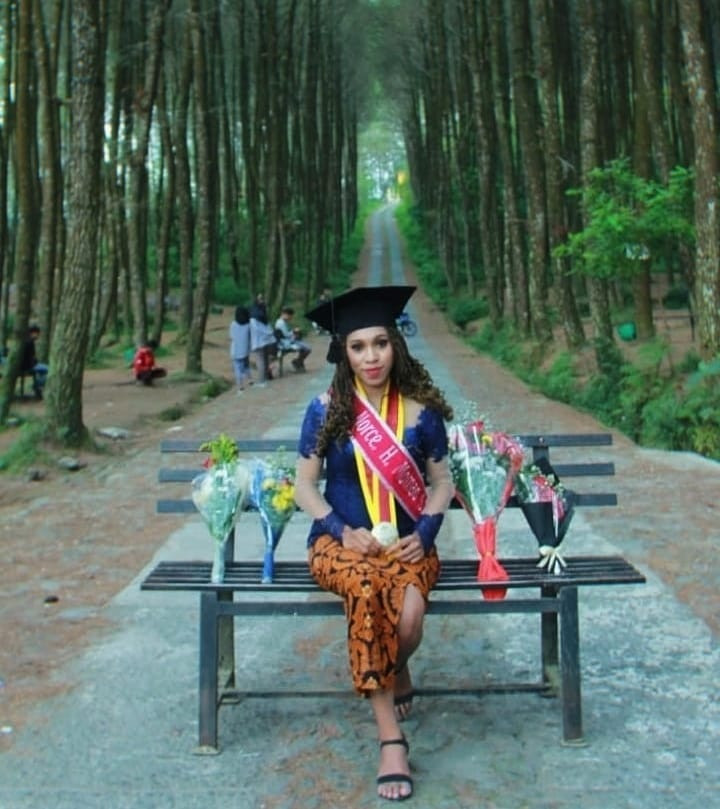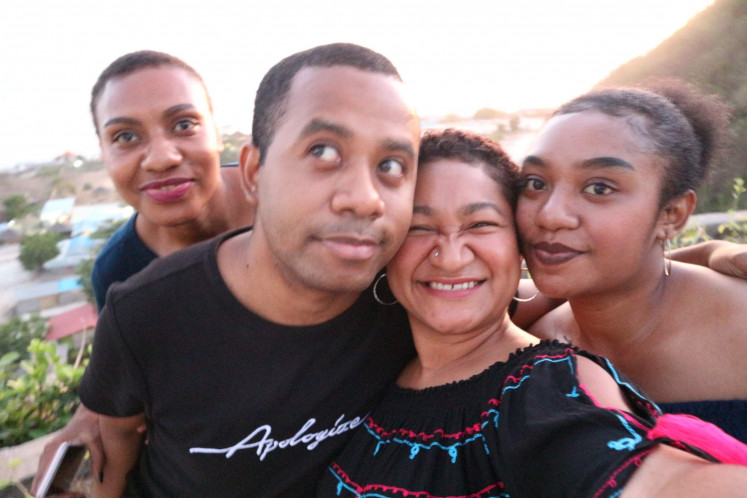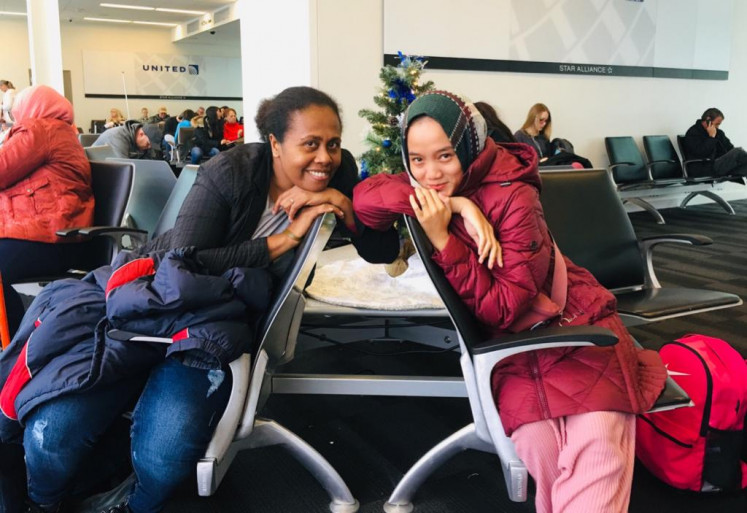Popular Reads
Top Results
Can't find what you're looking for?
View all search resultsPopular Reads
Top Results
Can't find what you're looking for?
View all search results‘Stop denying and listen to us’: Papuans hopeful for talk, action to end everyday racism
For years, media coverage on Papua has straddled narratives on politics, natural resources, development, security and human rights, but the issue of everyday racism in Papua still goes largely unnoticed.
Change text size
Gift Premium Articles
to Anyone
F
or years, media coverage on Papua has straddled narratives on politics, natural resources, development, security and human rights, attracting attention from around the world.
However, there is one issue that is still rarely discussed in public – the casual racism experienced by native Papuans in their day-to-day lives.
‘Do you think I’m an animal?’
“I remember I sometimes regretted my decision to study in Java. If only I knew it would be that hurtful, I would have just gone to a university in Sorong,” Norce Herlin Mak Momao, 24, told The Jakarta Post on Saturday.
Like many young Papuans, Norce left Sorong, her homeland, in 2013 and flew to Yogyakarta to go to university there, hoping to benefit from better higher education standards.
It was her first time living far away from her family, but she quickly learned how people tended to look at her and treat her differently because of her appearance or because she was from Papua.
Read also: How Papuan students deal with everyday racism
The first few years were the hardest for her, she said.
Finding a place to stay, for instance, was unnecessarily difficult. Once, the owner of a rooming house refused to take her in despite a sign advertising a vacancy up front. She was told there weren’t any rooms available.
“I think when they see Papuans they have this belief that we are mean human beings who will bring trouble to their place,” Norce said.
“When I go to restaurants or stores, I can feel how they stare at me from head to toe like there is something wrong with me. Those experiences made me want to stay in my room and avoid public places.”
Oftentimes, even when she was with friends or family in public places like malls and tourist sites, strangers would casually take out their mobile phone to record or take pictures of her without her consent, all the while giggling among themselves and making her feel like a laughing stock.
“One time I was so annoyed that I grabbed the cellphone from one of them and deleted the video of me they took. I told them, ‘do you think I’m an animal so you could treat me this way?’” she said. “They just went silent. They were adults, not some children. I was really angry.”
Norce Herlin Mak Momao poses for her graduation picture while surrounded by flowers from family and friends, after completing her master's degree in law from a university in Yogyakarta in May 2019. Norce is currently pursuing her doctoral degree and plans to return to her homeland in Sorong, Papua after she graduates. (Courtesy of/Norce Herlin Mak Momao)Norce’s sister, who is two years younger, also experienced such casual racism when she visited her for the holidays. It became such an unbearable experience that she decided to cancel her application to a university in Yogyakarta and return to Sorong to study.
“Maybe if I had lighter skin or straight hair, I wouldn’t be treated this way. But it is beyond our power to choose the physical appearance we are born with,” Norce said. “We are also human, like any other. If they say Papua is really part of Indonesia, then educate yourself about us. The world is not only filled with people of your own race; educate your children about the diversity we have.”
Norce is now pursuing a doctoral degree in law and working at a legal aid organization in Yogyakarta. She would return to Papua after graduating, she said, so that she could continue her work at a human rights organization.
Discussions on racism in Papua have flourished in online seminars and on social media following the death of black American George Floyd, which galvanized the #BlackLivesMatter movement in the United States, which rippled across to Indonesia. A number of local groups began to discuss racism in the country by campaigning that #PapuanLivesMatter too.
Read also: Papuan lives matter: George Floyd and colorism in Indonesia
Efforts to end years of racism against Papuans have not progressed fast enough, activists have bemoaned, but they believe the growing debate and sense of solidarity with the minority could be a good opportunity for change.
“Racism has been happening for decades in Papua, but these discussions can be a positive start, as more and more people start to recognize these public issues and start addressing the problem,” Elvira Rumkabu, an international relations lecturer at Cenderawasih University, said on Sunday.
“I believe this will bring change. We can’t end racism alone, we must do it together.”
Elvira said people had been reluctant to discuss issues related to Papua, mostly due to the running narrative that there are only two sides of the equation: separatism or the undisputable Unitary State of the Republic of Indonesia (“NKRI harga mati”).
“That’s the only narrative we have been fed. It has framed the discussion in a way that snuffs out any necessary debate on humanity. There is a fundamental human issue here that must be addressed; discussing Papua is discussing humanity,” she said.
‘Listen to us, stop denying’
Growing up dark-skinned with curly hair in Indonesia is not easy, says 25-year-old vlogger Barneci Nuboba.
As a native Papuan born and raised in Timika, Eci has seen how most young Papuan girls she knows have tried or been tempted to straighten their hair so they can feel better about themselves – so they can fit in.
As a response to this, she started the online campaign #talingkarclub on Instagram, where girls post pictures of themselves showing off their curly hair with pride and connect with one another for support using the hashtag. Talingkar is the Papuan word for curly hair.
“Growing up, we have no role models in Indonesia that can make us feel good about ourselves. Beautiful people are portrayed in the media only as light-skinned girls with straight hair,” Eci said.
Barneci Nuboba (second right) poses with her best friends while visiting Pandawa Beach in Bali in 2019. Born and raised in Timika, Papua, Eci has for the past few years actively campaigned self-love for young Papuan women and for them to embrace their naturally curly hair. (Courtesy of/Barneci Nuboba)Since 2018, Eci has been posting videos on her Youtube channel dedicated to curly hair treatments, like tips to use coconut oil as a moisturizer, as well as other how-to styling videos. She has amassed a loyal following of 6,000 subscribers on her channel and regularly speaks in Papuan dialects to make her Papuan audience feel comfortable.
However, her journey is not without its challenges.
“I often find many racist comments on my channel mocking my hair and my skin or saying that it’s ugly. At first it really brought me down, but nowadays I just delete them immediately. There are many young followers on my channel, so I don’t want them to get hurt by those comments,” she said.
Read also: Racism: My experience as a doctor in Papua
“Even after all the things that we’ve experienced, some people still say that this kind of racism does not exist. I want to say to those people that unless you are Papuan, you’ll never be able to fully understand it.
"Such racism is real and we face it every single day. So please listen to us and stop denying.”
‘If you don’t want to sit next to a Papuan, don’t come to Papua’
Even in their hometown, Papuans still face everyday racism. Yuliana Langowuyo, 37, the director of the Secretariat for Justice and Peace (SKPKC) Fransiskan Papua in Jayapura, shared just some of her stories that prove how casual racism can easily be found on the island.
Yuliana recounted the several times that non-Papuan commuters would cover their noses whenever she hopped on an angkot (public minivan) in Jayapura. “I could tell that people like that were new in town, because people don’t do that if they’ve been living here for years. It still makes me angry, though,” she said.
“One time, I met a lady who moved away from me in the angkot and was in a hurry to cover her nose and mouth with her jacket when she saw me. I told her, ‘if you don’t want to sit next to a Papuan, don’t come to Papua.’ Don’t come here just to hurt our feelings with that kind of attitude.”
It is not just about the slurs and hurt feelings that are visible in the everyday experiences of native Papuans. Yuliana said she also saw that discrimination was baked into the government’s development projects.
“There is a village called Kwarja in Jayapura. Jayapura’s native people live there, mostly cocoa farmers. There is [still] no asphalt road there, no schools or health facilities, and no electricity,” she told the Post.
Yuliana Langowuyo (left) and her friend Caca pose for the camera at Tulsa international airport in Oklahoma, the United States, while waiting for their flight to Albuquerque, New Mexico to attend an event held by the US mission to Indonesia. Yuliana is actively involved in advocating for human rights, justice and peace in Papua. (Courtesy of/Yuliana Langowuyo)Just 25 kilometers away from the village, in a residential complex built to accommodate people under the New Order’s transmigration scheme, the local administration has provided schools, health facilities and even an asphalt road to connect the five settlement units there, Yuliana said.
“People in my church [...] have tried for years to persuade the government to give better road access to the natives living in villages, but it’s so hard. They are still isolated and many of their children are still illiterate because they can’t go to school,” the activist complained.
Read also: Govt drops appeal against ruling on internet shutdown in Papua
“And this is happening in Jayapura, the capital city of Papua – can you imagine the discrimination that happens in other more rural regencies?”
To ensure that her nieces and the younger generations of Papuans won’t have to experience the same everyday racism and discrimination that she currently faces, Yuliana insists on bringing this fight to the authorities.
“This fight is not because we want to be glorified, we are involved in this fight so we can matter, just so we can be treated as other human beings. This is supposed to be our basic human right and the fact that we have to really struggle to achieve it is really saddening,” she said.
Where is the government in this discussion?
While more and more people have started to recognize the problem and tried to educate themselves about the struggles of everyday Papuans, activists have criticized the state for being so seemingly unmoved by the current changes underway.
“Up until today, the government has not responded to any of these discussions. We need to push for bigger change, a change in our political and social constructs, a structural and systemic policy to end racism, said Elvira from Cendrawasih University.
In a recent online discussion held by Human Rights Watch Group Indonesia, a National Commission on Human Rights (Komnas HAM) commissioner, Choirul Anam, highlighted that there was still no law enforcement measure that effectively addressed acts of racism in Indonesia.
Read also: Papuan protesters sentenced to less than one year for treason amid calls to drop charges
The people involved in alleged racial abuse against Papuan students in East Java last year were not even charged for their racist acts. Choirul said these people, which included military personnel and members of the general public, were instead charged for "making a commotion and being violent".
“We have failed to seriously address the matter at the heart of this racism case,” the commissioner said. "The government must use all the instruments at its disposal – from law enforcement, prevention to self-correction – to end racism."













